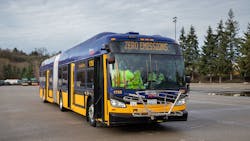King County Metro to purchase up to 120 battery-electric buses from New Flyer of America, Inc.
King County Metro has announced it will purchase 40 battery-electric buses from New Flyer of America, Inc., to be delivered in 2021 and plans to order 80 more in the coming year, according to an announcement from King County Executive Dow Constantine.
The order is comprised of 40, 60-foot articulated buses valued at $1.3 million each for a total of approximately $50 million. The remaining 80 battery-electric buses planned for purchase include 20 more articulated buses and 60, 40-foot buses, valued at approximately $925,000 each. Total cost for the second order, arriving in fall 2022, is estimated to be around $80 million.
In 2017, Executive Constantine and King County Metro General Manager Rob Gannon called on the industry to invest more in battery-electric options, including the creation of coaches that could travel farther and handle the varying terrain requirements of the region.
New Flyer produced both a 40-foot and 60-foot battery-electric bus that met King County Metro’s specifications and timeline needs. These long-range battery-electric buses can travel approximately 140 miles on a single charge. The 11 existing short-range battery-electric buses in King County Metro’s fleet are 40 feet and can travel 23 miles before requiring a 10-minute charge.
“Today, we’re celebrating major progress toward our goal of transforming Metro to a zero-emission bus fleet, which is better not only for the environment but also for our customers,” said Constantine. “These new buses will be able to serve routes all over King County, and especially in the southern part of the county, an area disproportionately affected by pollution. Working with New Flyer, we’ve procured 40 new buses that can handle anything we throw at them – quietly, efficiently and fueled by clean power.”
Battery-electric buses have been operating in King County since 2016, when King County began testing and evaluating bus options for long-term service. King County Metro says it had initially pursued a different manufacturer for the purchase of 73 buses in 2017, however that manufacturer does not currently have a 60-foot option. New Flyer was able to meet King County Metro’s fleet needs, warranting a pivot in the original planned purchase. King County Metro continues to test coaches from several manufacturers.
“This first fleet order of battery-electric buses helps combat the climate crisis and enhances our ability to serve our customers,” said Rob Gannon, King County Metro general manager. “Hundreds of thousands of King County residents choose safe and efficient transit each weekday—keeping their cars off the road and emissions out of the air. This new battery-electric bus partnership with New Flyer allows us to do even more to reduce our county’s carbon footprint.”
King County Metro has received a total of $20 million in grant funding to support the acquisition of these battery-electric buses. This secured funding consists of $9.1 million from the Federal Transit Administration, partly from the Low-or-No Emission Vehicle Deployment Program, and $10.9 million from the Washington State Department of Ecology Volkswagen Settlement program. An additional $3.3 million in grant funding from the new Washington State Department of Transportation’s Green Transportation Capital Program has been recommended and is currently pending a decision by the State Legislature.
“We have been talking about the need to drastically reduce our carbon footprint for a long time,” said Councilmember Jeanne Kohl-Welles, sponsor of the recently proposed ‘Jump Start’ legislation to speed up the electrification of King County Metro’s bus fleet. “Seeing these buses in person and knowing the benefit they bring to our communities is a reminder of how King County and Metro are leading the charge on climate change and as a result will continue to be a shining example to our region and nation as a whole. Generations are depending on us to act aggressively and urgently to do whatever we can right now to fight the worsening climate crisis. This is an important step.”
Coach details
The 120 coaches are New Flyer’s Xcelsior CHARGE model. The 60-foot coach has a capacity of up to 120 passengers a including driver and the 40-foot coach can hold up to 76 a including driver. Both bus models have a battery size of 466 kWh.
“Metro is a proven climate leader in America, and today’s announcement brings us even closer to the reality of a 100 percent zero-emission fleet by 2040,” said Chris Stoddart, president, New Flyer of America. “For over 40 years we’ve proudly supported Metro with over 1,800 buses in pursuit of sustainable mobility, and together, this next step drives a major milestone that not only reduces Metro’s carbon footprint in King County, but improves air quality and helps to build a more livable community for everyone.”
Charging infrastructure
The next milestone in King County Metro’s journey to a zero-emission fleet is the addition of base capacity and charging infrastructure to support battery-electric bus fleet operations. A phased approach is planned, starting with the completion of a temporary interim bus base in fall 2020 next to the existing South Base, adding capacity for approximately 125 buses. This extra capacity will support King County Metro’s existing diesel/hybrid fleet until the first order of new battery-electric buses arrives one year later. This interim base will house a charging system for 100 buses installed in phases starting in 2021, which will be capable of charging the 120 buses housed at that facility. King County Metro is investing $41 million into this hybrid base construction, with electrification infrastructure estimated to cost $50-$60 million.
After this initial procurement of 120 buses, King County Metro plans an additional procurement of 250 battery electric buses for delivery in 2025, by which time it plans to complete its South Annex Base on land currently occupied by its Training Center and Construction Management Office. This base will house 250 battery-electric buses and be built with battery-electric bus conversion at the forefront.
